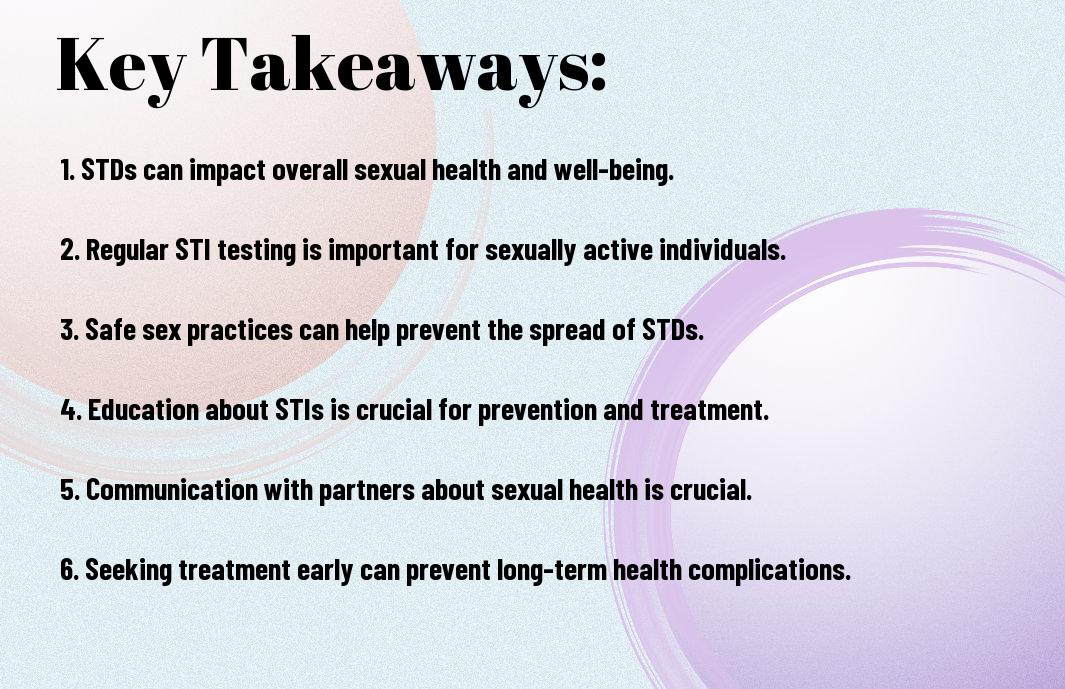STDs, or sexually transmitted diseases, play a crucial role in one’s overall sexual health. Understanding the connections between the two is vital for maintaining a healthy relationship with oneself and others. Addressing and treating STDs promptly can prevent long-term consequences, such as infertility, cancer, and other serious health issues. By prioritizing safe sex practices, regular testing, and open communication with partners, individuals can take charge of their sexual health and well-being.
Key Takeaways:
- STDs affect overall sexual health: Contracting sexually transmitted diseases can have significant impacts on an individual’s overall sexual health and well-being.
- Regular testing is crucial: Regular testing for STDs is crucial for maintaining good sexual health, as many infections can be asymptomatic.
- Communication is key: Open and honest communication with sexual partners about STDs and sexual health is vital to prevent the spread of infections.
- Prevention is better than cure: Taking preventive measures such as using condoms, practicing safe sex, and getting vaccinated can significantly reduce the risk of contracting STDs.
- Seeking medical help is important: If you suspect you have an STD or have been exposed to one, it is crucial to seek medical attention promptly for proper diagnosis and treatment.

The Link Between STDs And Overall Sexual Health
What is Sexual Health?
While many people associate sexual health solely with the absence of sexually transmitted diseases (STDs), the concept is much broader. Sexual health encompasses a state of physical, emotional, mental, and social well-being in relation to one’s sexuality. It involves a positive and respectful approach to sexuality and sexual relationships.
Importance of Sexual Health
With sexual health being a vital aspect of overall well-being, it is crucial to prioritize and maintain good sexual health practices. By taking care of one’s sexual health, individuals can enjoy a satisfying and safe sexual life. This includes regular STD testing, practicing safe sex, open communication with partners, and seeking help if any issues arise.
Defining and maintaining good sexual health not only reduces the risk of acquiring STDs but also contributes to a healthy mindset towards sexuality. It helps individuals build self-esteem, foster healthy relationships, and enhance overall quality of life.
The Prevalence of STDs
Some individuals may underestimate the prevalence of sexually transmitted diseases (STDs) in today’s society. STDs are more common than many people realize, impacting individuals of all ages, genders, and sexual orientations. Understanding the prevalence of STDs is crucial for promoting sexual health and well-being.
Statistics on STDs
The prevalence of STDs is staggering, with millions of new cases reported each year. According to the Centers for Disease Control and Prevention (CDC), there are approximately 26 million new STD cases reported annually in the United States alone. This alarming statistic highlights the importance of regular STD testing and practicing safe sex to prevent the spread of these infections.
Common Types of STDs
The most common types of STDs include chlamydia, gonorrhea, syphilis, herpes, HPV, and HIV. Chlamydia and gonorrhea are bacterial infections that can be easily treated with antibiotics if detected early. On the other hand, viral infections like herpes, HPV, and HIV are lifelong conditions that require ongoing management and care. Knowing the symptoms and treatment options for each type of STD is crucial for protecting one’s sexual health.
| Chlamydia | Gonorrhea |
| Syphilis | Herpes |
| HPV | HIV |
The Connection Between STDs and Sexual Health
How STDs Affect Sexual Health
Not taking care of your sexual health can have serious consequences, as STDs can significantly impact overall well-being. STDs not only affect physical health but also emotional and mental well-being. In some cases, the symptoms of STDs can be painful and uncomfortable, leading to a decrease in sexual desire and enjoyment. Additionally, the stigma associated with having an STD can result in feelings of shame and isolation, affecting self-esteem and relationships.
The Psychological Impact of STDs
With the prevalence of STDs on the rise, it’s important to consider the psychological effects they can have. Contracting an STD can lead to feelings of anxiety, depression, and fear. Individuals may experience stress over disclosing their status to partners or worry about being judged. The psychological impact of STDs can be far-reaching and should not be underestimated.
To combat the negative psychological effects of STDs, it’s crucial to seek support from healthcare professionals and loved ones. Early detection and treatment of STDs can help alleviate anxiety and fear, allowing individuals to focus on their overall well-being and sexual health. Keep in mind, you are not alone in this journey, and there are resources available to help you navigate through these challenges.
Risk Factors for STDs
Keep safe sexual practices in mind to prevent the spread of sexually transmitted diseases. Some of the key risk factors for contracting STDs include:
Unprotected Sex
For sexual health, it is imperative to always practice safe sex by using condoms and other barrier methods. Engaging in unprotected sex with multiple partners can significantly increase the risk of contracting STDs. The lack of protection during sexual intercourse leaves individuals vulnerable to infections such as gonorrhea, chlamydia, or HIV. Proper protection is crucial in maintaining sexual wellness.
The consequences of unprotected sex can have a long-lasting impact on an individual’s sexual health. The risk of STD transmission is significantly higher when protective measures are not taken.
Multiple Sexual Partners
Multiple sexual partners can increase the likelihood of exposure to STDs. Engaging in sexual activities with different partners raises the risk of infection transmission and can lead to a higher prevalence of sexually transmitted diseases. Individuals with multiple partners should be especially cautious and prioritize regular STI testing to monitor their sexual health.
Lack of Education
Lack of sexual education and awareness can also contribute to the risk of contracting STIs. Individuals who are not properly informed about sexual health practices may engage in risky behaviors unknowingly. Education on STD prevention and safe sex practices is crucial in promoting sexual wellness and reducing the spread of infections.
Understanding the importance of safe sex practices and regular STI testing is imperative in reducing the risk of STDs. With proper education and awareness, individuals can take proactive steps to protect their sexual health and prevent the transmission of sexually transmitted diseases.

Prevention and Protection
All A Guide to Taking a Sexual History can be a valuable tool in preventing and protecting against STDs. By understanding your sexual history and that of your partner, you can make more informed decisions about protection and prevention strategies.
Safe Sex Practices
The first line of defense against STDs is practicing safe sex. Using condoms consistently and correctly can greatly reduce the risk of contracting STDs. It’s important to remember that some STDs can be transmitted through skin-to-skin contact, so using barrier methods like condoms can provide an added layer of protection.
Getting Tested Regularly
The key to maintaining sexual health is getting tested regularly for STDs. Many STDs do not show symptoms, so the only way to know for sure if you are infected is to get tested. Testing is quick, easy, and confidential, and it can provide peace of mind or prompt treatment if needed.
Understanding your own risks and being proactive about testing can help prevent the spread of STDs and protect your overall sexual health.
Vaccination Options
To further protect yourself against STDs, consider vaccination options. Vaccines are available for some common STDs like HPV and hepatitis B. These vaccines have been shown to be highly effective in preventing infection and reducing the risk of associated health problems.
Practices such as safe sex, regular testing, and vaccination can all play a crucial role in maintaining good sexual health and preventing the spread of STDs. By being proactive and informed, you can take control of your sexual health and reduce the risk of STDs.
Managing STDs and Maintaining Sexual Health
After receiving a diagnosis of a sexually transmitted disease (STD), it is crucial to seek treatment promptly to address the infection and prevent potential complications. Any untreated STD can lead to severe health issues and may also be transmitted to sexual partners. Treatment options for STDs vary depending on the type of infection and may include antibiotics, antiviral medications, or antiretroviral therapy.
Treatment Options for STDs
To effectively manage and treat STDs, it is vital to follow the healthcare provider’s recommendations diligently. Completing the full course of medication, attending follow-up appointments, and practicing safe sex are all crucial aspects of managing STDs and preventing their spread.
Coping with the Emotional Toll of STDs
Another vital aspect of managing STDs is addressing the emotional impact of living with a sexually transmitted infection. STDs can evoke feelings of shame, guilt, fear, and anxiety, which can significantly impact mental well-being and relationships.
Building Healthy Relationships
Emotional support from friends, family, or a therapist can help individuals cope with the stigma and emotional challenges associated with STDs. Open and honest communication with sexual partners about one’s health status, practicing safe sex, and prioritizing mutual respect and trust are fundamental for maintaining healthy relationships while living with an STD.
Summing up
Overall sexual health is strongly connected to the presence of STDs, as untreated infections can lead to serious consequences such as infertility, pelvic inflammatory disease, and even certain types of cancer. Taking precautionary measures such as practicing safe sex, getting tested regularly, and communicating openly with partners about sexual health are key steps to maintaining a healthy sexual life.
As a final point, understanding the link between STDs and overall sexual health is crucial for individuals to make informed decisions about their sexual well-being. By staying informed, proactive, and responsible, we can work towards reducing the spread of STDs and promoting a safer and healthier sexual environment for everyone.
FAQ
Q: What is the connection between STDs and overall sexual health?
A: The link between STDs and overall sexual health is significant, as untreated STDs can lead to long-term health consequences and impact one’s overall well-being.
Q: How do STDs affect one’s sexual health?
A: STDs can affect sexual health by causing symptoms such as pain, discharge, and discomfort during sexual activity, as well as leading to complications like infertility and increased risk of HIV transmission.
Q: What are the common types of STDs that can impact overall sexual health?
A: Common STDs that can impact overall sexual health include chlamydia, gonorrhea, syphilis, herpes, HPV, and HIV. It is important to practice safe sex to prevent the spread of these infections.
Q: How can one maintain good sexual health and prevent STDs?
A: To maintain good sexual health and prevent STDs, individuals should practice safe sex by using condoms, get regular STD screenings, communicate openly with sexual partners about sexual history, and seek treatment promptly if an STD is suspected.
Q: Why is it crucial to address STDs promptly for overall sexual health?
A: Addressing STDs promptly is crucial for overall sexual health to prevent the progression of the infection, reduce the risk of complications, protect sexual partners from transmission, and maintain a healthy and fulfilling sex life.



